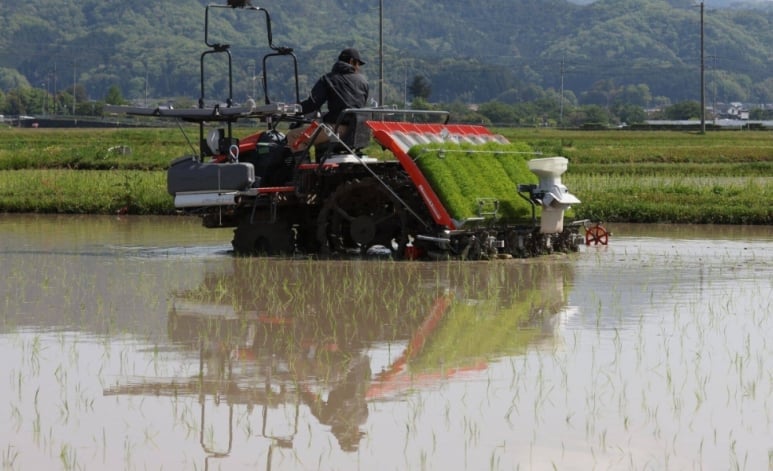December 3, 2025 | 17:40 GMT +7
December 3, 2025 | 17:40 GMT +7
Hotline: 0913.378.918
December 3, 2025 | 17:40 GMT +7
Hotline: 0913.378.918

Despite the government releasing rice from its emergency stockpile since March, prices have remained high. | BLOOMBERG.
The average supermarket price of 5 kilograms of rice dropped last week for the first time since December, falling ¥19 to ¥4,214 in Japan. This amounts to a 0.4% decline from the week starting April 28, the farm ministry announced Monday.
However, the hefty ¥4,000 price tag is still more than double the price from the same period last year.
Angry netizens took to X to express their frustration over the slight drop.
"They said on the TV news that the price of rice dropped, but the amount of the price drop was ¥19. ... You call that a price drop?" one post read.
“We understand that the price of rice blends using stockpiled rice is lower than the average price of rice sold in retail stores, with the cheapest ones being in the mid-¥3,000 price range including tax — we believe this is a result of the increased supply of stockpiled rice to retail stores,” Chief Cabinet Secretary Yoshimasa Hayashi said on Tuesday.
Despite the government releasing rice from its emergency stockpile since March, prices have remained high, partly because of the time it takes distributors to ship the auctioned rice to wholesalers.
Japan's National Federation of Agricultural Cooperative Associations (Zen-Noh) purchased about 200,000 metric tons of stockpiled rice out of the government's supply of 310,000 tons, but as of May 8, only around 63,000 tons—about 32%—had been shipped to wholesalers.
According to Zen-Noh, it plans to distribute around 140,000 tons, or 70%, of its rice supply by the end of July.
The major distributor said they have been delivering an average of 2,000 to 3,000 tons of rice to buyers every day. However, distribution efforts slowed during the first week of May due to the Golden Week holidays.
The government plans to continue releasing rice from its emergency stockpile every month until around the end of July as it considers potentially revising the conditions for the auction.
Currently, bidders are limited to major distributors such as Zen-Noh, and auctions occur under the condition that the government will buy back the same amount of rice from the distributors within the next year.
“We are discussing what can be done in light of the current situation on a daily basis within the ministry,” said Japan's Agricultural Minister Taku Eto on Tuesday. “I will make a firm announcement once a policy has been decided.”
If the auction can be expanded to include more companies, it will likely lead to an increase in distribution channels and help circulate the rice more quickly in the market.
Japantimes

(VAN) Despite numerous challenges, Vietnam's key seafood products are maintaining strong momentum, setting the stage for full-year exports to potentially reach USD 11 billion.

(VAN) The signing of a protocol between Viet Nam and China on the export of fresh jackfruit represents a significant milestone in agricultural trade cooperation between the two countries.

(VAN) On November 27, the Ninh Binh Department of Agriculture and Environment and the Institute for Green Growth Research organized a training course on greenhouse gas inventory for businesses.

(VAN) China’s cooking oil is suddenly flooding into India. It all comes down to a soybean surplus that Beijing doesn’t quite know what to do with.

(VAN) An Giang promotes supply-demand connections, standardizes quality and builds value chains, creating a foundation for sustainable bird’s nest development and aiming to expand exports.
/2025/11/24/5339-4-nongnghiep-075331.jpg)
(VAN) Recently, the conference on 'Sustainable Fisheries Linkage Chain - Tilapia for Export' took place in Tien Hai commune, Hung Yen province.
/2025/11/21/4309-2-153400_128.jpg)
(VAN) Green and low-emission rice is paving the way for Vietnamese rice to enter high-end markets, marking the beginning of a transformation journey toward greening and elevating the national rice brand.